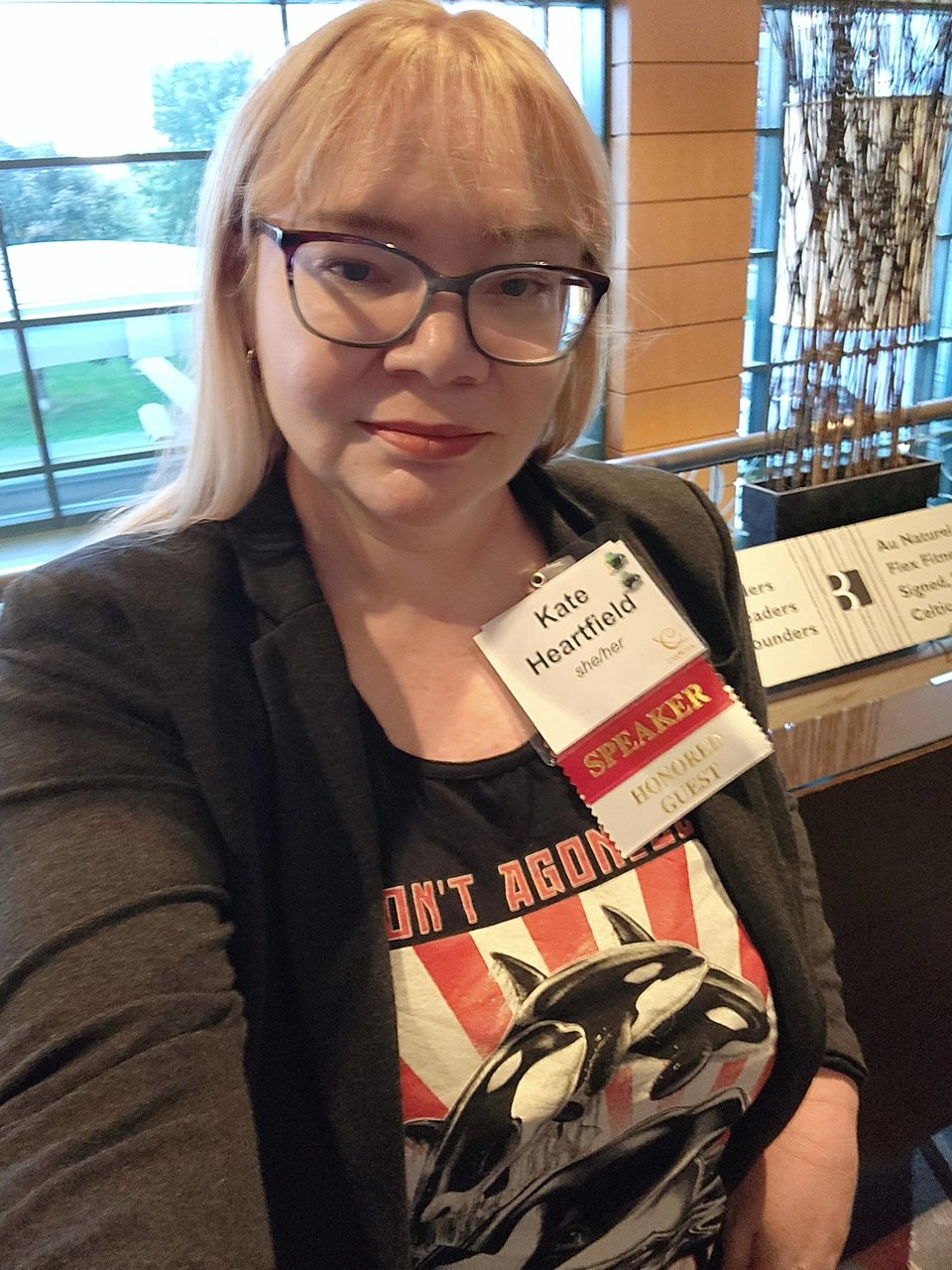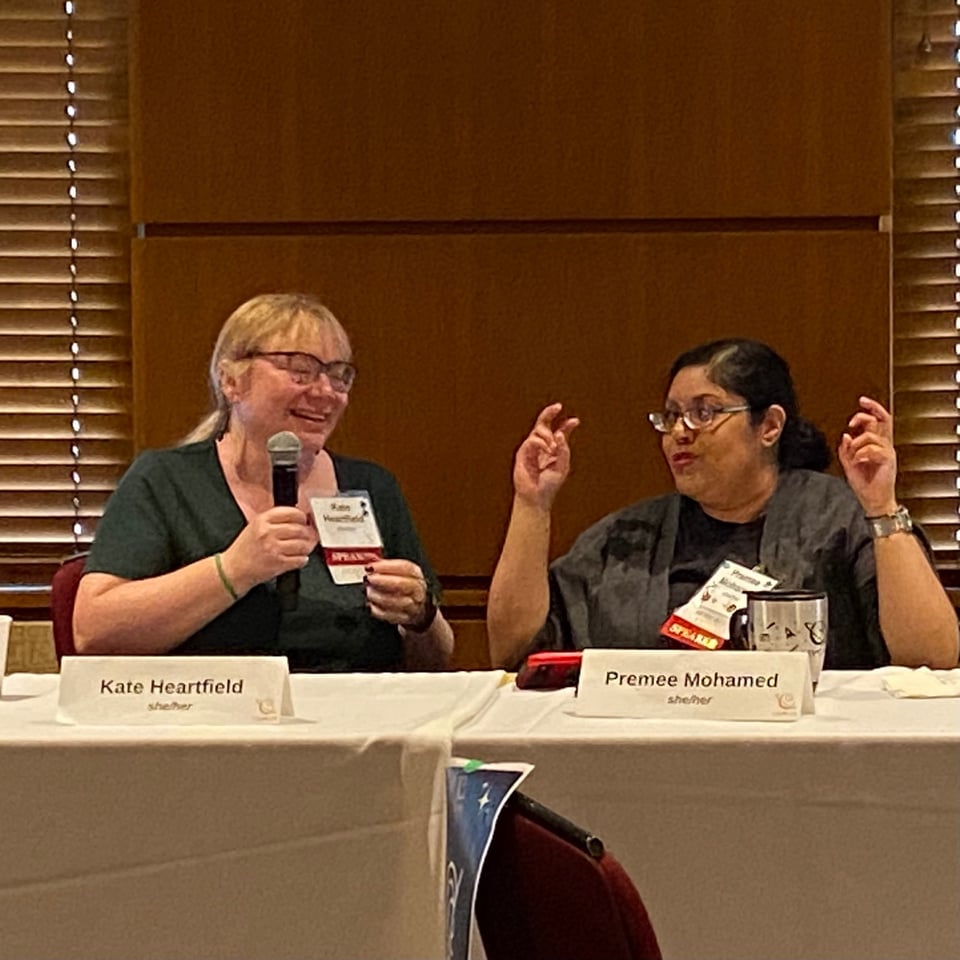Last weekend, I was one of the guests of honour at Can*Con, here in Ottawa. My fellow guests of honour were Premee Mohamed and Stephen Kotowych, both of whom are extremely cool people to hang out with. I’ve been going to Can*Con every year for, well, I don’t even remember how long but roughly a decade and a half. So I was particularly touched when they asked me to be guest of honour — I mean, they know I’m going to come anyway! It also made the experience of being a guest of honour anywhere for the first time more comfortable, since it’s a convention where I know so many people and where the culture and vibes are familiar to me.

There are various kinds of festivals and conventions that authors go to, and they all have different cultures and expectations. Can*Con, like other fan-run conventions that focus on science fiction, fantasy and horror, is run by volunteers and is not trying to make a profit. Very much a labour of love. Unlike literary festivals, the speakers on panels are attendees like everyone else, and expected to pay their own way, including the membership fees. (Some cons discount or refund membership fees for panelists, but not many, in my experience, and anyway, that’s only a small part of the overall cost: travel, hotel and food are the big budget items.)
The great thing about everybody-pays con culture is that there’s (almost) no line between the “talent” and the other attendees, and we all eat together and chat together.
The less-great thing about it is, well, I do not want to think about how many thousands of dollars I have spent over the last 15 years to travel to conventions. I have always gone for business reasons (learning my craft, meeting people in my field, and eventually, promoting my work), although I also see my friends there. I don’t go to many; between one and three conventions, most years. But if one of those conventions is more than driving distance away, that’s several thousand dollars just to get there and have somewhere to sleep.
Publishers typically don’t pay for authors to attend conventions, unless they’re pretty big authors. Even when there is publisher support for travel, it’s more likely to be a bigger library or media convention. Literary festivals have a culture of paying travel and honoraria, and publishers will also sometimes chip in for what the festivals don’t.
But fan-run, for-the-love conventions have a long and deep history within SFFH culture. I go not only to promote my books but also because I enjoy it. Without Can*Con in my life, as a hub for the Ottawa writing community, there’s no way I’d have the career I have today. I like chatting with fellow readers, booksellers and authors. I like the conversations I have on panels. And even 15 years into regularly attending conventions, I still go to panels to sit in the audience and learn from people who have different backgrounds and perspectives on our industry and craft. I hope and expect I always will.
There are a few exceptions to the “we’re all just paying attendees” culture. Every year, a convention will choose a few people (typically between 3 and 8 people) to be their guests of honour: authors, editors, artists, agents, occasionally very active fans. Being a guest of honour means you get your travel and hotel paid for (I had a suite! A SUITE!) and you might also get an honorarium or per diems to cover your food.
One of the coolest parts of about being guest of honour, for me at Can*Con, is that the programming team really wanted to make sure I was able to talk about things that I wanted to talk about. So I was able to suggest an “in conversation” with my fellow GOH Premee Mohamed, which was definitely a highlight for me, and it was well attended.

I also had panels on Monstrous Retellings and on New Fronts in World War Fiction, which were great. And I had a signing and a really lovely kaffeeklatsch (a small group of people who sign up in advance for a conversation).
Another thing guests of honour sometimes do is participate in the opening ceremonies for the convention. That part was a little like being present at my own funeral, as Brandon Crilly (a friend, talented writer and vice-chair of the con) spoke about why the con had chosen me, and said generous things about my role in the community. I admit I was gradually sinking into the hole that opened up under my chair at this point, but it was so inspiring to hear, because if I am remembered for anything when I leave this Earth, I would like it to be some degree of kindness and service to others. So I will now spend the rest of my life endeavouring to live up even a little to Brandon’s introduction of me.
Can*Con has grown to about 500 attendees now, and many are newcomers, so obviously I don’t know everyone, despite what my teenager contends (he found it very annoying to have to stop to talk to someone every few feet whenever he was with me). For most people I talked to, I was just Kate. They’ve known me for years and would congratulate me on being GOH, maybe rib me gently about it. (There were a lot of good-natured jokes from people I’ve known for years about opening doors for me or fetching me things.) But for the attendees encountering me for the first time in that context, there was a bit of an unusual dynamic. After a while of feeling weird about this, I just started observing it, as if from a distance.
An aspect of being guest of honour is that you’re a little bit more “on” all the time, which can be a challenge for a massive introvert like me. Taking on that new role made me think about the people whose social behaviour in the SFFH community I have tried to model. One is definitely Charles de Lint, who was not there this weekend (I did get a chance to talk to him at World Fantasy in Niagara Falls last year, though.)
Charles has an amazing ability to, in his very quiet and unassuming way, devote his full attention and curiosity to the person he’s speaking with. A conversation of a few minutes with him always makes me feel seen and appreciated, even though he’s often the centre of attention in any convention hallway, because of his long and illustrious career. Although I am fine with public speaking, I find small talk or mingling very draining. I’ve found that doing my best to emulate Charles, to focus my genuine curiosity on one person at a time (even if only a fraction of a minute in a group conversation) helps to make everything less of an exhausting blur. And it means that I get to connect with really smart, thoughtful and interesting people. So viewing the convention hallway as an opportunity for those connections, rather than a gamut of pro forma small talk, really helped me keep my mental energy up.
Another pattern in my social interactions started to emerge as the weekend went on. Everyone — people I’ve known for years, people I’d just met — kept saying things like “I won’t keep you, Kate, I know you have a million things to do” — and the thing is, yes, I was run off my feet, but I always am, at a con. And the person talking to me probably was too!
Noticing that was when it dawned on me what being guest of honour meant, to me anyway. It meant recognition — officially and within the culture — that I was working that weekend. That I should not be out of pocket, as this was my work. That I needed a comfortable hotel room to retreat to and recharge my introvert batteries, rather than driving home at the end of every day to save money, as I usually do. That my time should be respected. That my expertise and ideas were valuable.
And as lovely and affirming as that was for me, the messed up structural thing about that is that it was equally my work last year, when I was just another paying attendee. It was equally work for my friends who were at the con who are querying agents now, or selling their books in the vendors’ room. It was definitely work for the con committee and the volunteers who made it all possible.
So at the end of the day, I’m grateful to this wonderful con for honouring me this way, not only for the emotional, psychological, symbolic and promotional support — although all that is lovely too — but also for material support, which is so thin on the ground in this industry. For three days, I got to experience something I wish we all could, more of the time: the feeling of our creative labour not coming at the cost of the sacrifice of our basic needs. I’ve had a few invitations to literary festivals that came with paid travel and an honorarium, but I’d never experienced that feeling overlapping with convention culture before.
The con committee and volunteers were amazing throughout. I hope I contributed to the convention, which was marvelous, and it was really lovely to connect with readers and other writers. Big shoutout to Bakka Phoenix for selling my books at the con — they have a bunch of signed editions from me in their Toronto shop now.

One thing I neglected to do: take photos! This newsletter contains pretty much all I took, except for Sylvain Neuvel wearing an octopus costume and weird hotel art. Priorities, I guess!
I don’t have any more plans to attend conventions in the near future; I’m excited about Tri-Con, the new convention in Halifax, but I’m still paying off a family trip from the summer so I don’t think I can make it work for the budget this year. Hopefully next! Montreal has a WorldCon in 2027, and I’ll almost certainly be there. Edmonton is bidding for WorldCon in 2030, which sounds great. Other than those, I’ll likely stick to Can*Con for the near future, and I’ll go to whatever festivals and conventions invite me if I can.
A final note: it was really lovely that the Can*Con program book noted the loss of writer Leo Valiquette, who died in 2024, far too young. I’ve been hanging out with Leo at conventions since our sons were playing together in the Lego room at Ad Astra in 2013, and I really missed him this year. You can read an excerpt from his excellent fantasy novel The Bane of All Things here, and I’d also encourage you to pick up the novel from a store or library.
You just read issue #47 of Kate Heartfield's Newsletter. You can also browse the full archives of this newsletter.
